Business Law and Ethics: Review of Ethics Education in Legal Sector
VerifiedAdded on 2023/04/20
|5
|1247
|153
Essay
AI Summary
This essay critically examines ethical conduct within the legal profession, particularly focusing on the shortcomings identified among solicitors, barristers, and law students. It references a study highlighting the challenges legal professionals face in adhering to ethical practices and emphasizes the necessity of integrating moral values into legal education. The essay discusses the impact of media reports on public perception, the limitations of professional codes of conduct, and the importance of veracity, consistency, and sincerity in ethical legal practice. It also explores reasons for unethical behavior, such as adversarial pressures and increasing competition, and advocates for the incorporation of ethics and professional values into law graduate programs to cultivate moral understanding, judgment, motivation, and character among future lawyers, encouraging them to embrace their moral and social responsibilities.
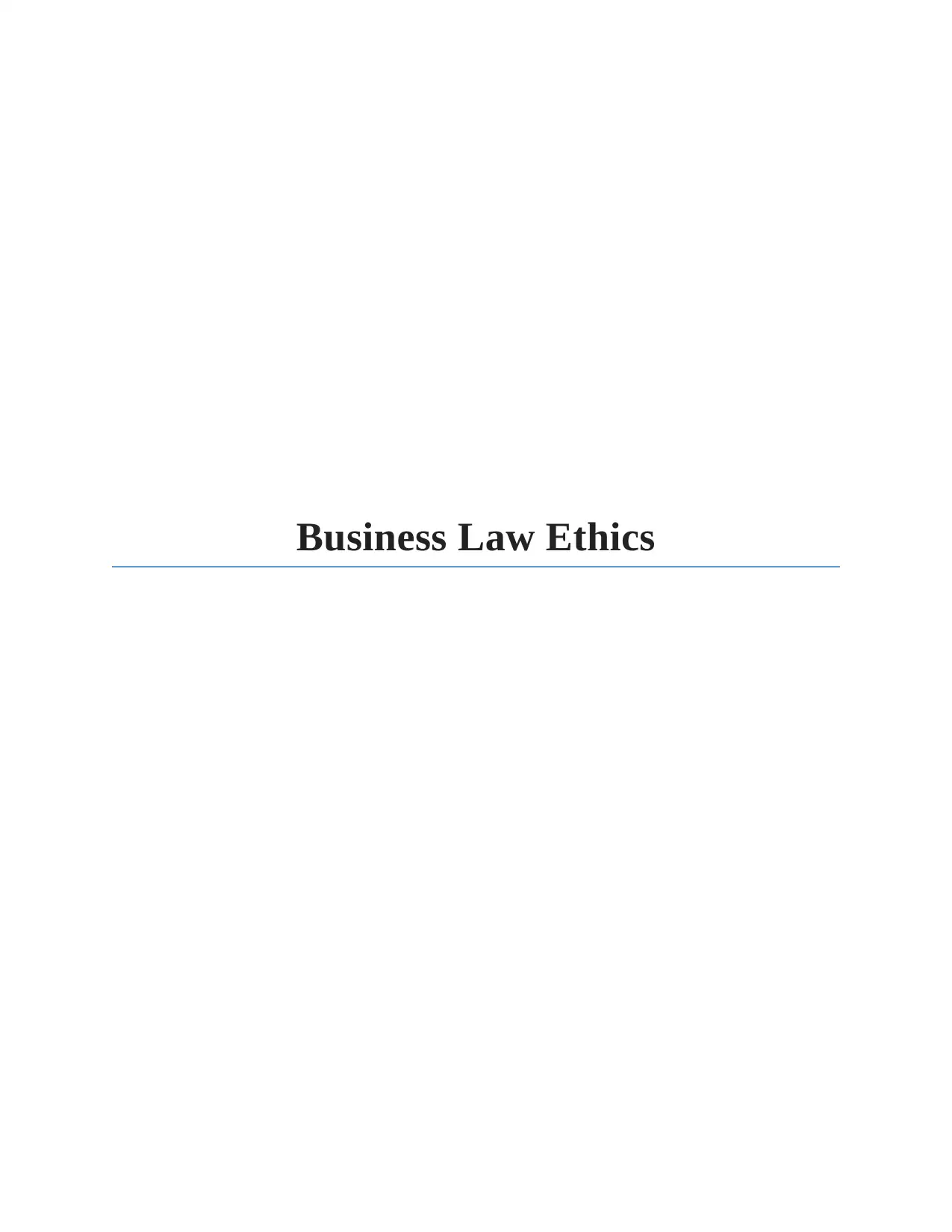
Business Law Ethics
Paraphrase This Document
Need a fresh take? Get an instant paraphrase of this document with our AI Paraphraser
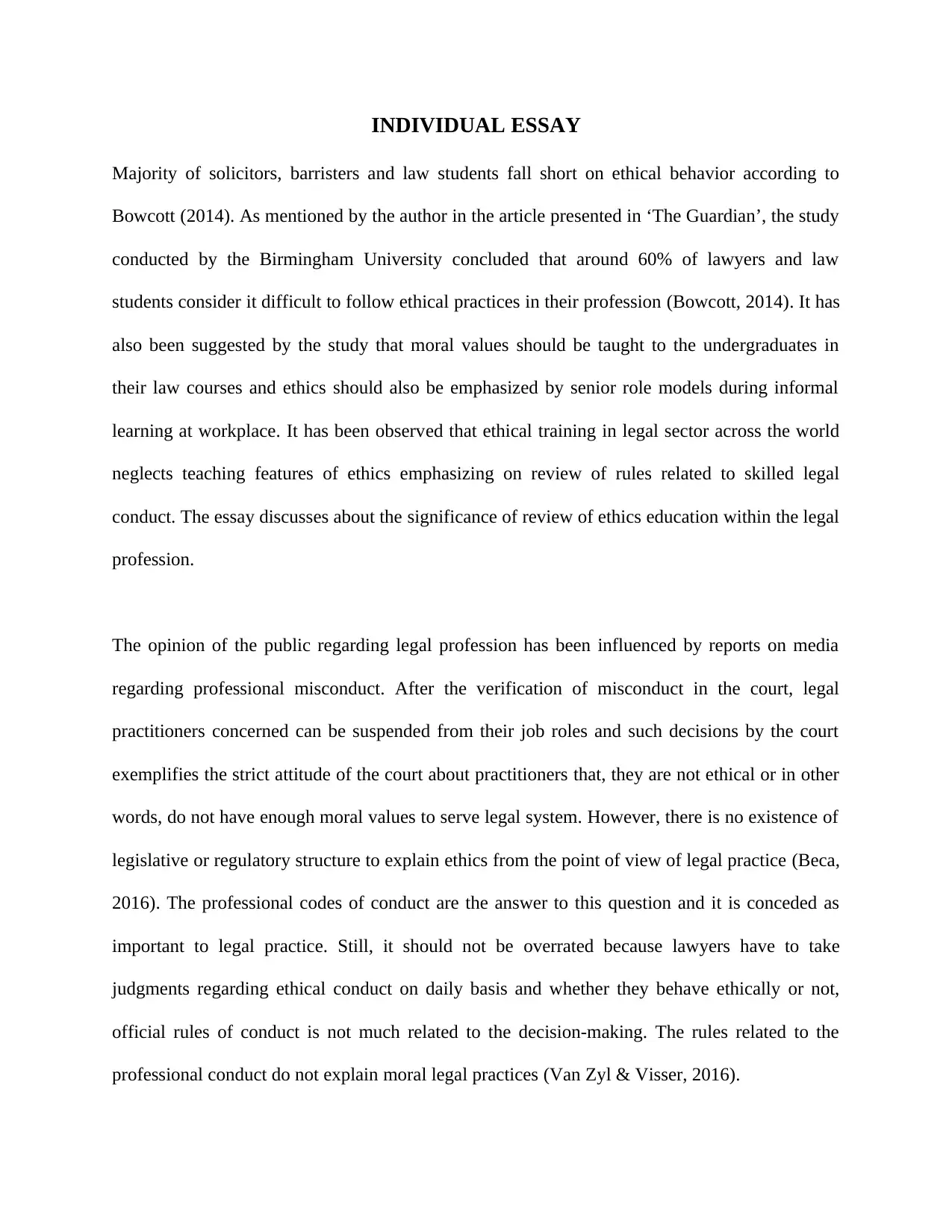
INDIVIDUAL ESSAY
Majority of solicitors, barristers and law students fall short on ethical behavior according to
Bowcott (2014). As mentioned by the author in the article presented in ‘The Guardian’, the study
conducted by the Birmingham University concluded that around 60% of lawyers and law
students consider it difficult to follow ethical practices in their profession (Bowcott, 2014). It has
also been suggested by the study that moral values should be taught to the undergraduates in
their law courses and ethics should also be emphasized by senior role models during informal
learning at workplace. It has been observed that ethical training in legal sector across the world
neglects teaching features of ethics emphasizing on review of rules related to skilled legal
conduct. The essay discusses about the significance of review of ethics education within the legal
profession.
The opinion of the public regarding legal profession has been influenced by reports on media
regarding professional misconduct. After the verification of misconduct in the court, legal
practitioners concerned can be suspended from their job roles and such decisions by the court
exemplifies the strict attitude of the court about practitioners that, they are not ethical or in other
words, do not have enough moral values to serve legal system. However, there is no existence of
legislative or regulatory structure to explain ethics from the point of view of legal practice (Beca,
2016). The professional codes of conduct are the answer to this question and it is conceded as
important to legal practice. Still, it should not be overrated because lawyers have to take
judgments regarding ethical conduct on daily basis and whether they behave ethically or not,
official rules of conduct is not much related to the decision-making. The rules related to the
professional conduct do not explain moral legal practices (Van Zyl & Visser, 2016).
Majority of solicitors, barristers and law students fall short on ethical behavior according to
Bowcott (2014). As mentioned by the author in the article presented in ‘The Guardian’, the study
conducted by the Birmingham University concluded that around 60% of lawyers and law
students consider it difficult to follow ethical practices in their profession (Bowcott, 2014). It has
also been suggested by the study that moral values should be taught to the undergraduates in
their law courses and ethics should also be emphasized by senior role models during informal
learning at workplace. It has been observed that ethical training in legal sector across the world
neglects teaching features of ethics emphasizing on review of rules related to skilled legal
conduct. The essay discusses about the significance of review of ethics education within the legal
profession.
The opinion of the public regarding legal profession has been influenced by reports on media
regarding professional misconduct. After the verification of misconduct in the court, legal
practitioners concerned can be suspended from their job roles and such decisions by the court
exemplifies the strict attitude of the court about practitioners that, they are not ethical or in other
words, do not have enough moral values to serve legal system. However, there is no existence of
legislative or regulatory structure to explain ethics from the point of view of legal practice (Beca,
2016). The professional codes of conduct are the answer to this question and it is conceded as
important to legal practice. Still, it should not be overrated because lawyers have to take
judgments regarding ethical conduct on daily basis and whether they behave ethically or not,
official rules of conduct is not much related to the decision-making. The rules related to the
professional conduct do not explain moral legal practices (Van Zyl & Visser, 2016).
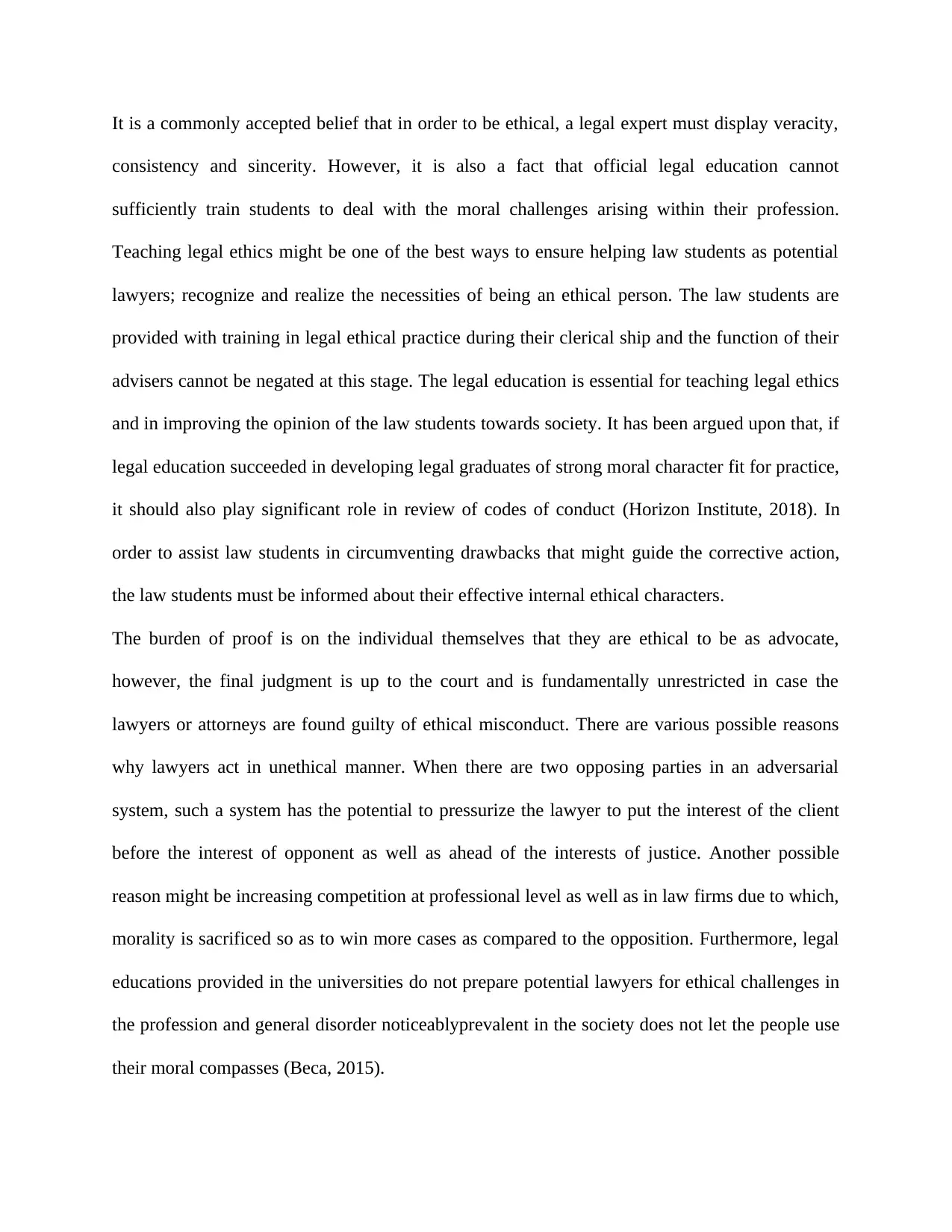
It is a commonly accepted belief that in order to be ethical, a legal expert must display veracity,
consistency and sincerity. However, it is also a fact that official legal education cannot
sufficiently train students to deal with the moral challenges arising within their profession.
Teaching legal ethics might be one of the best ways to ensure helping law students as potential
lawyers; recognize and realize the necessities of being an ethical person. The law students are
provided with training in legal ethical practice during their clerical ship and the function of their
advisers cannot be negated at this stage. The legal education is essential for teaching legal ethics
and in improving the opinion of the law students towards society. It has been argued upon that, if
legal education succeeded in developing legal graduates of strong moral character fit for practice,
it should also play significant role in review of codes of conduct (Horizon Institute, 2018). In
order to assist law students in circumventing drawbacks that might guide the corrective action,
the law students must be informed about their effective internal ethical characters.
The burden of proof is on the individual themselves that they are ethical to be as advocate,
however, the final judgment is up to the court and is fundamentally unrestricted in case the
lawyers or attorneys are found guilty of ethical misconduct. There are various possible reasons
why lawyers act in unethical manner. When there are two opposing parties in an adversarial
system, such a system has the potential to pressurize the lawyer to put the interest of the client
before the interest of opponent as well as ahead of the interests of justice. Another possible
reason might be increasing competition at professional level as well as in law firms due to which,
morality is sacrificed so as to win more cases as compared to the opposition. Furthermore, legal
educations provided in the universities do not prepare potential lawyers for ethical challenges in
the profession and general disorder noticeablyprevalent in the society does not let the people use
their moral compasses (Beca, 2015).
consistency and sincerity. However, it is also a fact that official legal education cannot
sufficiently train students to deal with the moral challenges arising within their profession.
Teaching legal ethics might be one of the best ways to ensure helping law students as potential
lawyers; recognize and realize the necessities of being an ethical person. The law students are
provided with training in legal ethical practice during their clerical ship and the function of their
advisers cannot be negated at this stage. The legal education is essential for teaching legal ethics
and in improving the opinion of the law students towards society. It has been argued upon that, if
legal education succeeded in developing legal graduates of strong moral character fit for practice,
it should also play significant role in review of codes of conduct (Horizon Institute, 2018). In
order to assist law students in circumventing drawbacks that might guide the corrective action,
the law students must be informed about their effective internal ethical characters.
The burden of proof is on the individual themselves that they are ethical to be as advocate,
however, the final judgment is up to the court and is fundamentally unrestricted in case the
lawyers or attorneys are found guilty of ethical misconduct. There are various possible reasons
why lawyers act in unethical manner. When there are two opposing parties in an adversarial
system, such a system has the potential to pressurize the lawyer to put the interest of the client
before the interest of opponent as well as ahead of the interests of justice. Another possible
reason might be increasing competition at professional level as well as in law firms due to which,
morality is sacrificed so as to win more cases as compared to the opposition. Furthermore, legal
educations provided in the universities do not prepare potential lawyers for ethical challenges in
the profession and general disorder noticeablyprevalent in the society does not let the people use
their moral compasses (Beca, 2015).
⊘ This is a preview!⊘
Do you want full access?
Subscribe today to unlock all pages.

Trusted by 1+ million students worldwide
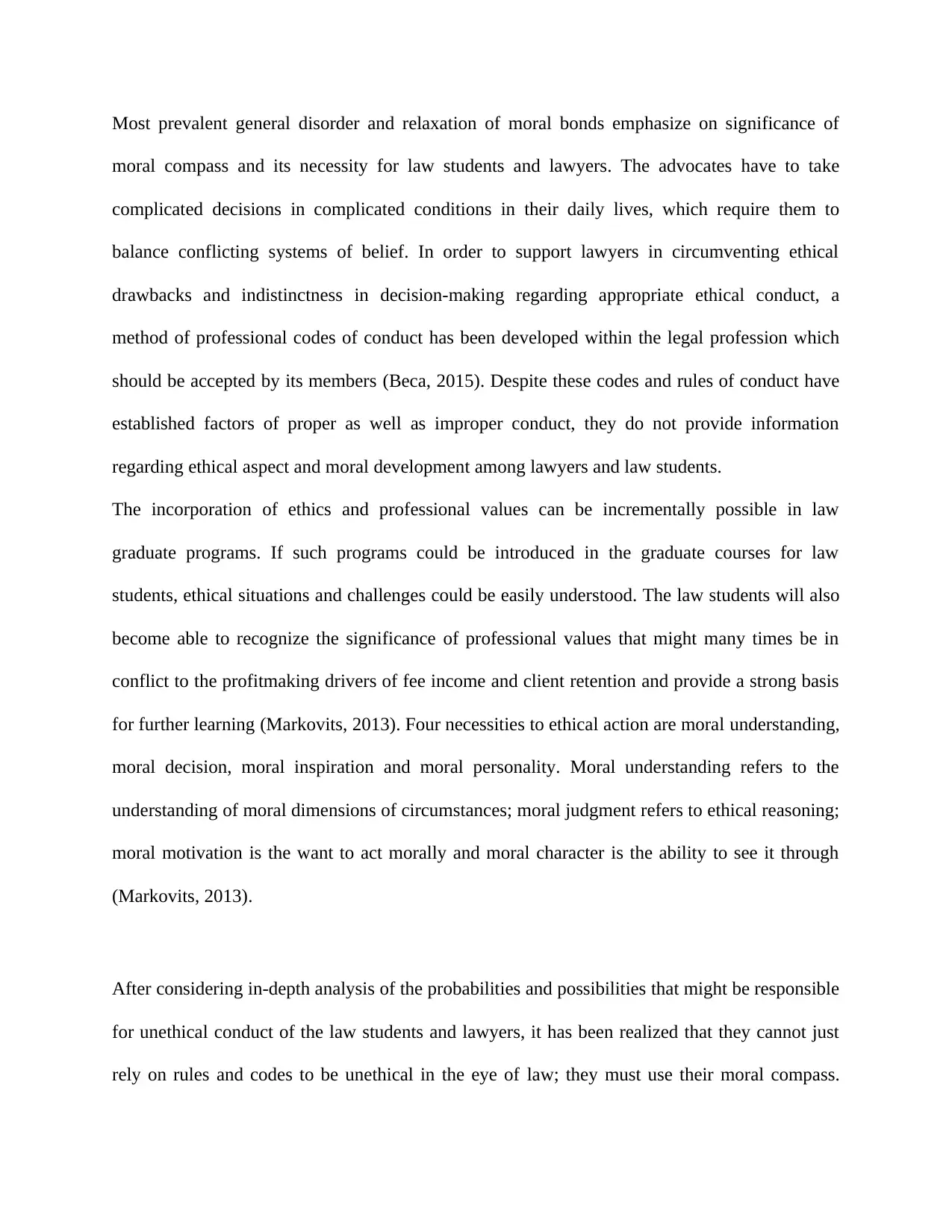
Most prevalent general disorder and relaxation of moral bonds emphasize on significance of
moral compass and its necessity for law students and lawyers. The advocates have to take
complicated decisions in complicated conditions in their daily lives, which require them to
balance conflicting systems of belief. In order to support lawyers in circumventing ethical
drawbacks and indistinctness in decision-making regarding appropriate ethical conduct, a
method of professional codes of conduct has been developed within the legal profession which
should be accepted by its members (Beca, 2015). Despite these codes and rules of conduct have
established factors of proper as well as improper conduct, they do not provide information
regarding ethical aspect and moral development among lawyers and law students.
The incorporation of ethics and professional values can be incrementally possible in law
graduate programs. If such programs could be introduced in the graduate courses for law
students, ethical situations and challenges could be easily understood. The law students will also
become able to recognize the significance of professional values that might many times be in
conflict to the profitmaking drivers of fee income and client retention and provide a strong basis
for further learning (Markovits, 2013). Four necessities to ethical action are moral understanding,
moral decision, moral inspiration and moral personality. Moral understanding refers to the
understanding of moral dimensions of circumstances; moral judgment refers to ethical reasoning;
moral motivation is the want to act morally and moral character is the ability to see it through
(Markovits, 2013).
After considering in-depth analysis of the probabilities and possibilities that might be responsible
for unethical conduct of the law students and lawyers, it has been realized that they cannot just
rely on rules and codes to be unethical in the eye of law; they must use their moral compass.
moral compass and its necessity for law students and lawyers. The advocates have to take
complicated decisions in complicated conditions in their daily lives, which require them to
balance conflicting systems of belief. In order to support lawyers in circumventing ethical
drawbacks and indistinctness in decision-making regarding appropriate ethical conduct, a
method of professional codes of conduct has been developed within the legal profession which
should be accepted by its members (Beca, 2015). Despite these codes and rules of conduct have
established factors of proper as well as improper conduct, they do not provide information
regarding ethical aspect and moral development among lawyers and law students.
The incorporation of ethics and professional values can be incrementally possible in law
graduate programs. If such programs could be introduced in the graduate courses for law
students, ethical situations and challenges could be easily understood. The law students will also
become able to recognize the significance of professional values that might many times be in
conflict to the profitmaking drivers of fee income and client retention and provide a strong basis
for further learning (Markovits, 2013). Four necessities to ethical action are moral understanding,
moral decision, moral inspiration and moral personality. Moral understanding refers to the
understanding of moral dimensions of circumstances; moral judgment refers to ethical reasoning;
moral motivation is the want to act morally and moral character is the ability to see it through
(Markovits, 2013).
After considering in-depth analysis of the probabilities and possibilities that might be responsible
for unethical conduct of the law students and lawyers, it has been realized that they cannot just
rely on rules and codes to be unethical in the eye of law; they must use their moral compass.
Paraphrase This Document
Need a fresh take? Get an instant paraphrase of this document with our AI Paraphraser
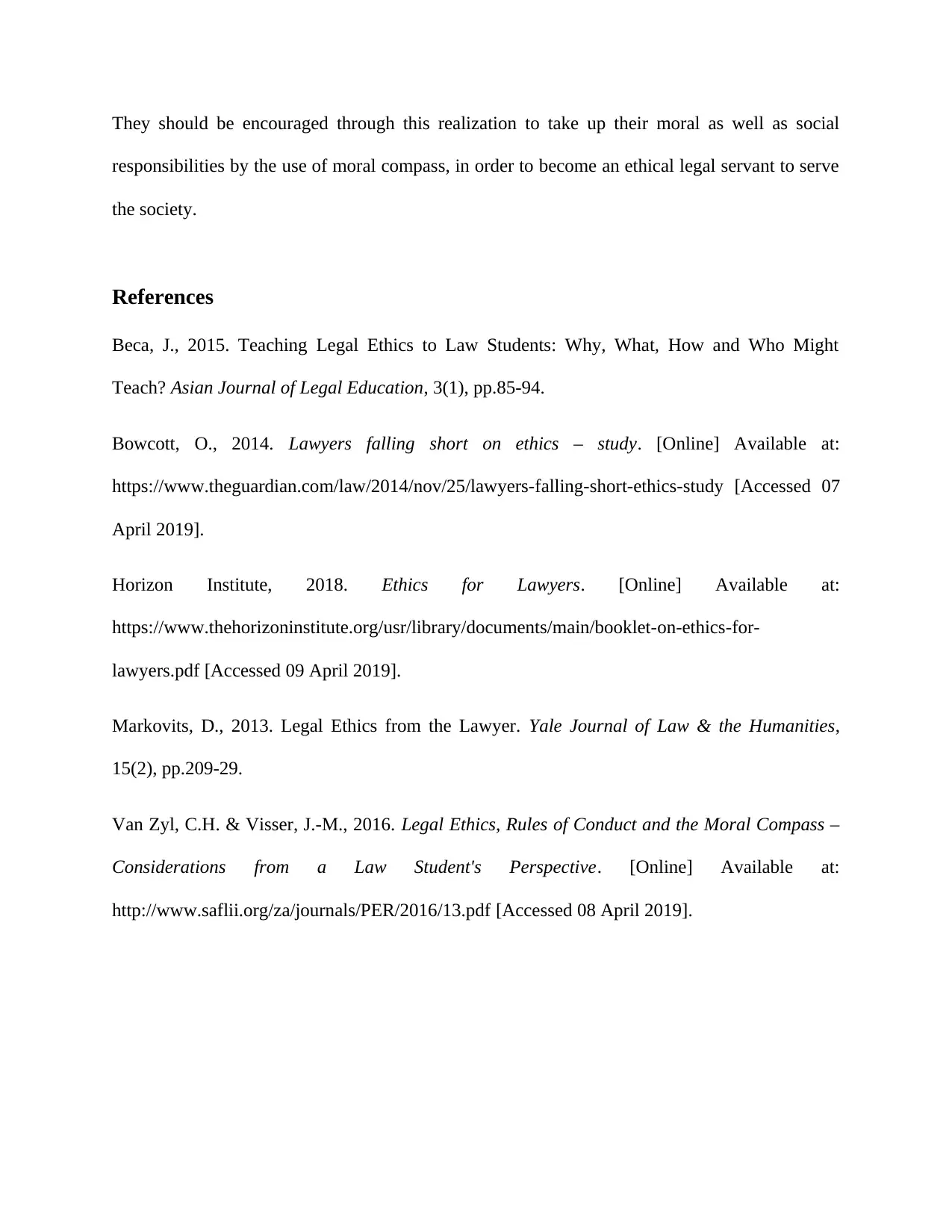
They should be encouraged through this realization to take up their moral as well as social
responsibilities by the use of moral compass, in order to become an ethical legal servant to serve
the society.
References
Beca, J., 2015. Teaching Legal Ethics to Law Students: Why, What, How and Who Might
Teach? Asian Journal of Legal Education, 3(1), pp.85-94.
Bowcott, O., 2014. Lawyers falling short on ethics – study. [Online] Available at:
https://www.theguardian.com/law/2014/nov/25/lawyers-falling-short-ethics-study [Accessed 07
April 2019].
Horizon Institute, 2018. Ethics for Lawyers. [Online] Available at:
https://www.thehorizoninstitute.org/usr/library/documents/main/booklet-on-ethics-for-
lawyers.pdf [Accessed 09 April 2019].
Markovits, D., 2013. Legal Ethics from the Lawyer. Yale Journal of Law & the Humanities,
15(2), pp.209-29.
Van Zyl, C.H. & Visser, J.-M., 2016. Legal Ethics, Rules of Conduct and the Moral Compass –
Considerations from a Law Student's Perspective. [Online] Available at:
http://www.saflii.org/za/journals/PER/2016/13.pdf [Accessed 08 April 2019].
responsibilities by the use of moral compass, in order to become an ethical legal servant to serve
the society.
References
Beca, J., 2015. Teaching Legal Ethics to Law Students: Why, What, How and Who Might
Teach? Asian Journal of Legal Education, 3(1), pp.85-94.
Bowcott, O., 2014. Lawyers falling short on ethics – study. [Online] Available at:
https://www.theguardian.com/law/2014/nov/25/lawyers-falling-short-ethics-study [Accessed 07
April 2019].
Horizon Institute, 2018. Ethics for Lawyers. [Online] Available at:
https://www.thehorizoninstitute.org/usr/library/documents/main/booklet-on-ethics-for-
lawyers.pdf [Accessed 09 April 2019].
Markovits, D., 2013. Legal Ethics from the Lawyer. Yale Journal of Law & the Humanities,
15(2), pp.209-29.
Van Zyl, C.H. & Visser, J.-M., 2016. Legal Ethics, Rules of Conduct and the Moral Compass –
Considerations from a Law Student's Perspective. [Online] Available at:
http://www.saflii.org/za/journals/PER/2016/13.pdf [Accessed 08 April 2019].
1 out of 5
Related Documents
Your All-in-One AI-Powered Toolkit for Academic Success.
+13062052269
info@desklib.com
Available 24*7 on WhatsApp / Email
![[object Object]](/_next/static/media/star-bottom.7253800d.svg)
Unlock your academic potential
Copyright © 2020–2026 A2Z Services. All Rights Reserved. Developed and managed by ZUCOL.





